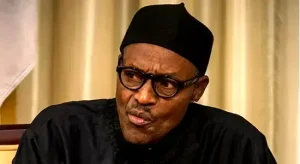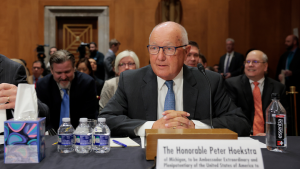
Amazon cancels Chinese orders, plans $15billion U.S expansion amid steep U.S tariffs
Amazon is considering a $15 billion investment to expand its U.S based warehouse network...
Read More
Comment
0

Panic as three headless bodies found floating in Ondo river
Anxiety has gripped residents of Odigbo, in Odigbo council area of Ondo State, as three headless bodies were discovered floating in a river.
Read More
Comment
0

2Baba’s lover introduces self as ‘nee Idibia’ at plenary, sparks laughter in Edo Assembly
“My name is Honourable Natasha Irobosa Osaworu, née Idibia,” she said in a video seen by TheCable before getting into her speech during the state assembly plenary.
Read More
Comment
0
SEN. BLUMENTHAL: “There is no apparent hope for a deal with China.”
“Trump has thrown a bomb into the global economy…”
SEN. BLUMENTHAL: “There is no apparent hope for a deal with China.” pic.twitter.com/Dbuaby2lFF
— Daily Caller (@DailyCaller) April 9, 2025
Comment
0

Matic labels Onana ‘one of United’s worst goalkeepers’
"At least I've lifted trophies with the greatest club in the world. Some can't say the same."
Read More
Comment
0

I left office with the same physical assets I had before becoming president- Buhari
FORMER President Muhammadu Buhari has advised those in leadership positions to attach more importance to the welfare of the people than their personal welfare.
Read More
Comment
0
Adam Schiff to probe White House insider trading
Adam Schiff says he will “find out” if members of the White House are involved in insider trading
Adam Schiff says he will “find out” if members of the White House are involved in insider trading
pic.twitter.com/pbqmKVOdkp
— Daily Caller (@DailyCaller) April 9, 2025
Comment
0

Senate confirms Peter Hoekstra as U.S. ambassador to Canada amid tense bilateral ties
The U.S. Senate has confirmed Peter Hoekstra as ambassador to Canada, amid strained relations and controversial tariffs under President Trump.
Read More
Comment
0

Bessent: Provoking China was Trump’s plan from the start
The comments offer fresh insight into the Trump administration’s hardline approach to China and its global trade strategy.
Read More
Comment
0

Peter Obi speaks on alleged defection from Labour Party
“I have never discussed leaving the Labour Party with anyone.”
Read More
Comment
0